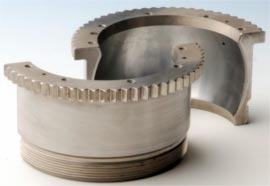With nearly 30 years’ experience of delivering tangible, real world benefits to manufacturers across most business sectors, leading UK ERP author Exel Computer Systems plc has accumulated an unprecedented level of insight and understanding regarding the most critical demands made on ERP systems within different markets. Aerospace manufacturers have long relied on this expertise and here Exel shares the most important factors these companies are taking into consideration when deciding on their ERP investment.
The common theme that runs through them all is an absolute commitment to quality and safety, whether they’re supplying an individual precision machined component or an entire wing section or engine assembly. At the heart of providing this is the necessity for complete product traceability and serialisation. Whereas earlier ERP systems often had to rely on 3rd party solutions or costly bespoke programming, modern state-of-the-art systems such as EFACS E/8 have complete product traceability, batch and/or serialisation, as standard. EFACS E/8 offers the flexibility and configuration possibilities of both backwards and forwards traceability ‘out of the box’ reducing initial cost and ongoing overheads.

Linked to this is the requirement for aerospace ERP systems to provide full certification and document control. In earlier ERP systems with basic capabilities, this still involved a lot of duplication in terms of generating the relevant documents, scanning and filing these, and then tailoring them to the different requirements of individual customers. Modern ERP systems such as EFACS E/8, designed with the needs of the aerospace sector in mind, provide automated and integrated functionality via a combination of workflow and document management. This dovetails seamlessly with the system’s traceability as all relevant certification/documentation is linked at either a batch or serial number level.
The third element that works in partnership with this functionality is the First Action Inspection Requirement (FAIR). Each manufacturer will have their own process logic which conforms to rigorous aerospace requirements that determines when a complete inspection is required. It also defines the full extent of any inspection that is to be carried out. Again, once the preserve of 3rd party suppliers or costly bespoke work, modern systems such as EFACS E/8 have been designed from the outset to deliver fully automated and configurable workflow as standard. This provides a failsafe against any future changes in procedure as the system can be quickly and easily updated to reflect the latest underlying logic.
Non-Conformance Management (NCM) is another key requirement aerospace manufacturers are increasingly looking to their ERP systems for. As each manufacturer has their own unique quality manual, any system needs to have the ease of customisation to reflect this which is why this has traditionally been the preserve of 3rd party solutions or complex spreadsheets. Modern systems such as EFACS E/8 don’t just provide an integrated, customisable solution, they allow this to be immediately accessible across the entire enterprise, meaning that as and where an issue arises, it can be immediately logged and then actioned accordingly. This not only provides manufacturers with the ability to take a snapshot across the business of the current non-conformance issues, it allows Business Intelligence (BI) to be done on historic data so that trends can be quickly analysed and appropriate responses taken at a strategic as well as tactical level.
Whilst not a requirement for every aerospace manufacturer, the means to manage Maintenance Repair and Overhaul (MRO) requirements is critical for those that do have the need. Because of this, such functionality was often left to 3rd party suppliers which could lead to data ownership and duplication issues as well as accountability concerns should a problem arise. EFACS E/8 was designed from the outset to meet these needs and has integral functionality which allows components returned for MRO to be allocated a unique item code and routing information, all of which forms part of an intelligent Product Lifecycle Maintenance (PLM) approach.
Just as improving connectivity and visibility throughout the business brings a range of benefits, so likewise does extending this out into the supply chain. A good example of this is the automated link developed by Exel to connect EFACS E/8 with the Exostar EDI system. Manufacturers reliant on manually downloading supplier information from portals can take several days to do this, including verifying the orders, before they can even begin scheduling their own work requirements. By automating this with the EFACS E/8 – Exostar link, all information can be received and verified, often within minutes which provides a time saving measured in days as well as all the increased flexibility in terms of work schedule that also comes from this.
While every aerospace manufacturer has to make quality and safety two of their key objectives, how they do this is becoming an area where true competitive advantage is increasingly to be found. By integrally automating traceability and workflow at such a highly customisable level, there is the potential to generate considerable cost and time savings not just in the present, but also the future as any external and internal considerations occur.

